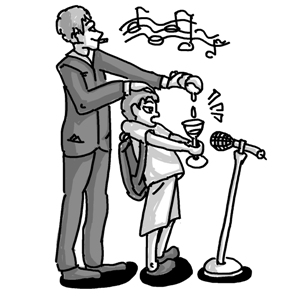
Illustration: Lu Ting/GT
My adolescent daughter was disappointed to be informed by her classmates recently that their reservation for a private room at a local karaoke parlor had been cancelled. The reason was very simple: juveniles are not allowed to enter entertainment venues such as night clubs and karaoke establishments.
I was rather surprised to hear the news since I had always encouraged my daughter and her friends to relax and have fun after exams or during holidays. Singing, dancing and dining out together should be a part of their young lives. Given that most of them don't have siblings, it's important that they spend time socializing with companions. I sometimes even organized karaoke gatherings for my daughter and her friends. While the children sing, we parents either watch them or find a quiet place nearby to chat.
Many local parents share my view that all work and no play makes Jack a dull boy. We would like to see our kids enjoy modern life instead of just concentrating on textbooks. My initial reaction toward the crackdown on underage admission to KTV parlors was one of disapproval, and I assumed that the authorities were overreacting to some individual cases.
But when I saw a press release from the Shanghai Municipal People's Prosecutor's Office, I changed my mind.
According to the office, juvenile crime at entertainment venues has been on the rise since 2010. The number of cases against suspects under 18 rose from 46 cases involving 70 suspects in 2010 to 80 cases involving 112 suspects in 2012.
The crimes committed by the juvenile offenders included fighting, robbery, fraud and rape. About 64 percent of the criminals were charged with crimes involving violence, such as instigating fights, assault and brawling, the Global Times reported on Thursday.
Until I read the report, I was not aware of a regulation implemented in 2006 prohibiting anyone under 18 years of age from entering dance clubs, karaoke parlors or other clubs for the purpose of dancing or singing. I took it for granted that with the company of their parents, it's an acceptable practice for adolescents to have a good time.
There are clearly problems in the enforcement of the regulation. I had been bringing my daughter to sing at karaoke establishments for the past five years, where we often saw teenagers or even younger children. In the interest of greater profits, staff simply turn a blind eye to underage admissions. If there is a temporary crackdown, they might take some countermeasures.
The more I relate the latest crackdown to a few national cases, the more I shudder.
I can't help thinking of Tang Hui, mother of the victim of a child rape and forced prostitution case, now a household name in China.
In 2006, Tang's then 11-year-old daughter was kidnapped, raped and sent to an entertainment establishment where she was forced to work as a prostitute. It took Tang months to find her daughter. The rapists and kidnappers received various sentences in courts in Central China's Hunan Province. But Tang was not satisfied with the verdicts and she persistently petitioned for harsher punishments for the culprits. She ended up being sent to a local reeducation-through-labor camp. Tang drew a lot of sympathy online and was released early after staying in the camp for nine days.
But with more details and questions made to known to public, her case stirred controversy with mass media and Internet celebrities divided on whether Tang was a real victim or someone who had interfered with justice. Tang's case is complicated and continues to be debated.
Her daughter, however, was indisputably a victim during her three-month stay at the entertainment establishment in 2006, the same year that the regulation went into effect.
If the regulation about underage admission had been enforced and the public had stronger awareness about the protection of minors, her daughter might have been rescued earlier. China doesn't lack laws or regulations, the real problem lies with the enforcement of laws.
The crackdown also reminds me of the rumor following Shanghai's court officials' scandal that Party officials are not allowed to visit entertainment venues like night clubs. Five officials were captured on video footage posted online on August 1 that appears to show them soliciting prostitutes at a night club in a hotel in Pudong New Area.
We all know that entertainment venues exist because there is demand for them. These establishments don't necessarily incubate wrongdoing or criminal activity, but self-discipline must be practiced by venue management.
If there is big market demand for venues open to juveniles, I hope there will be designated places for kids to have a good time. I believe that children shouldn't be deprived of the right to sing in private rooms at KTV venues. A precondition is that a special registration and supervision system should be established to guarantee that they are simply places for singing. No alcohol or cigarettes will be available.
At the same time, I sincerely hope that the crackdown is not a short-term show. Legislation is meaningless if it is not enforced. Only then can tragedies like Tang's daughter's case be avoided and the protection of children be guaranteed.

